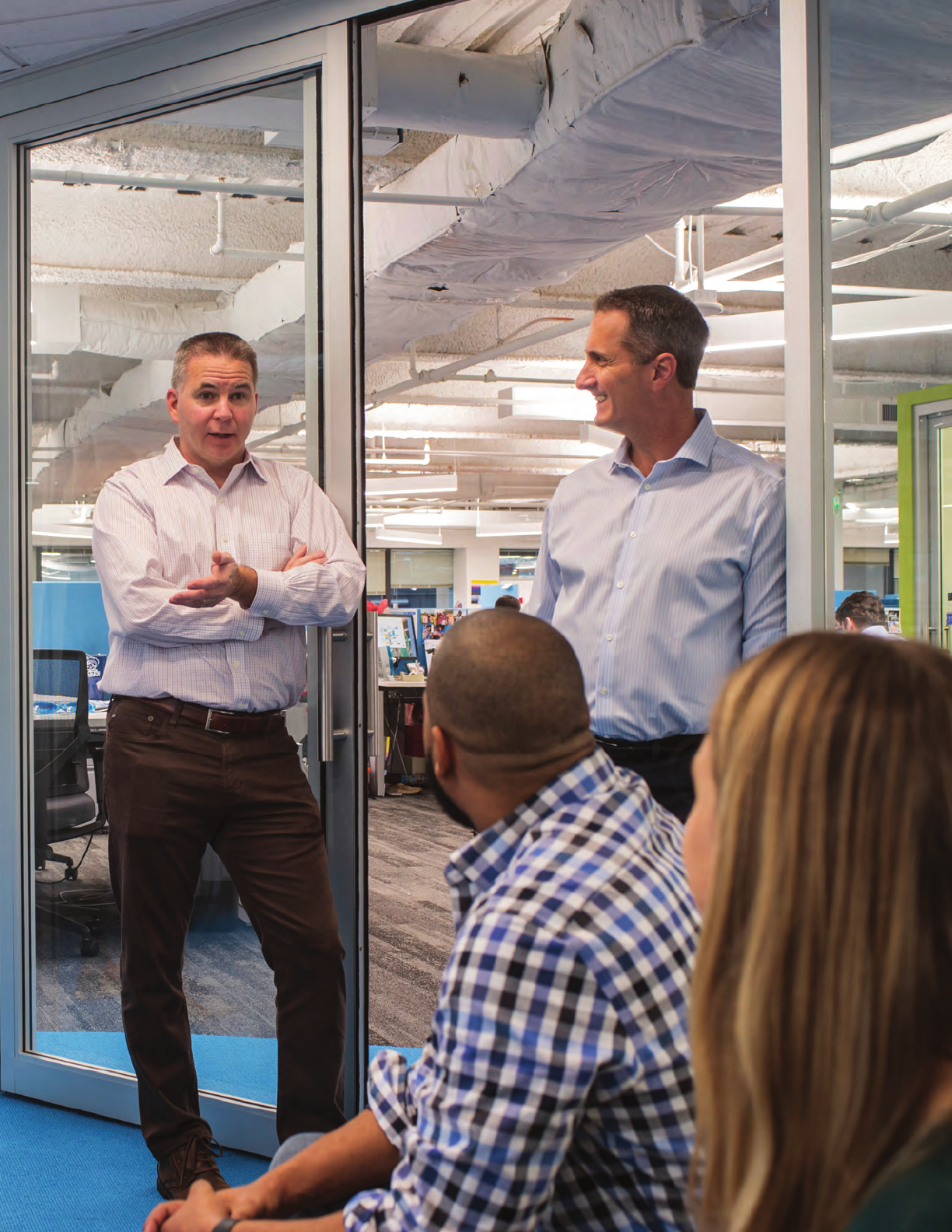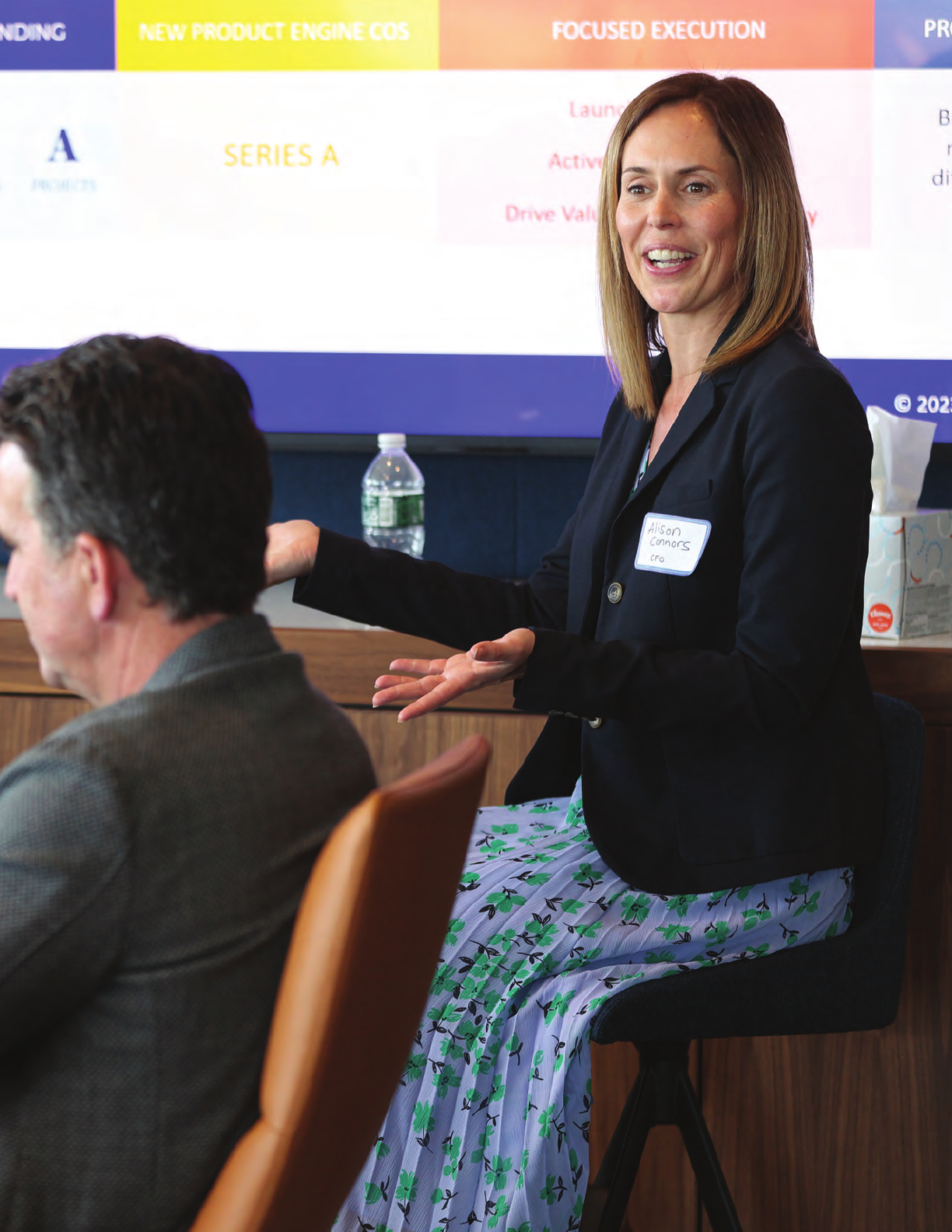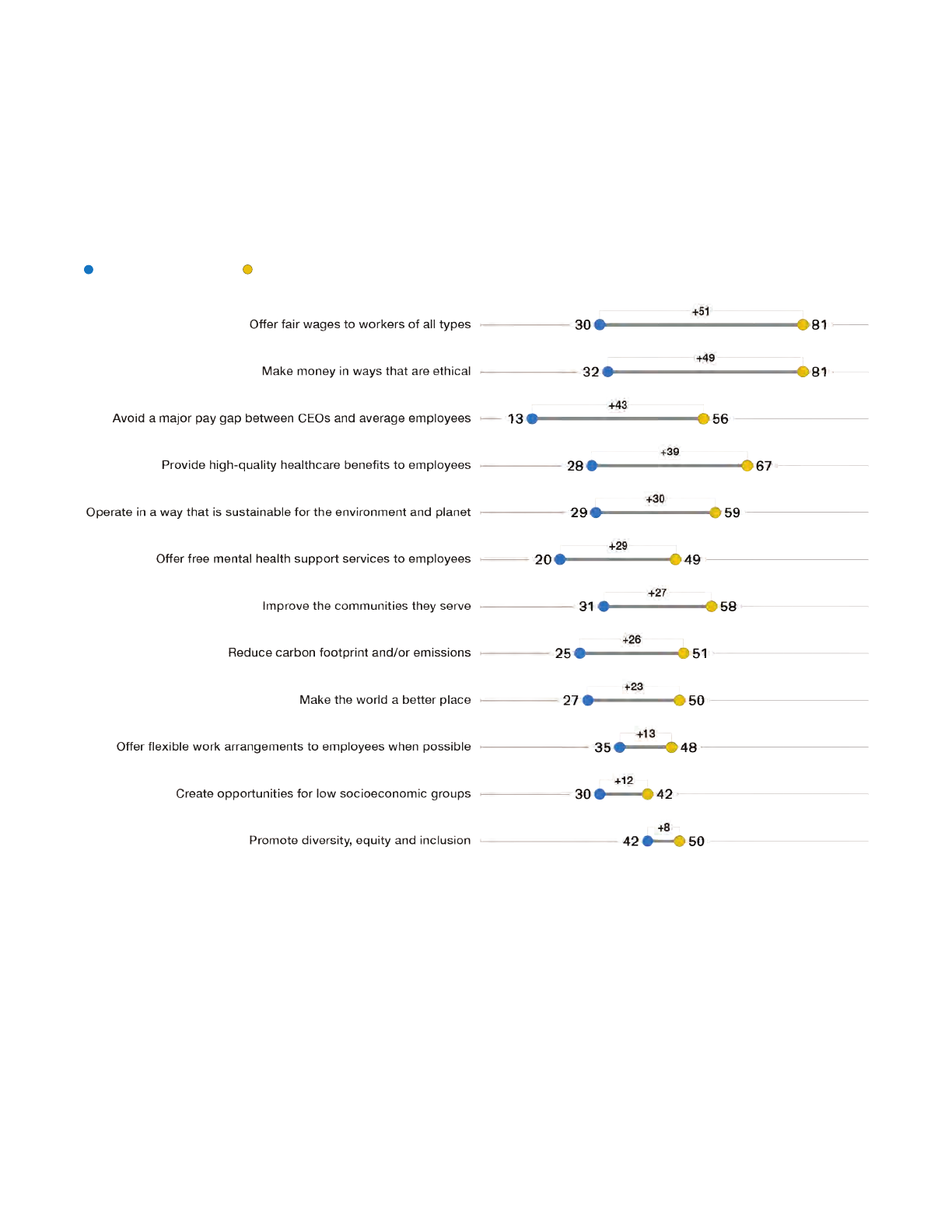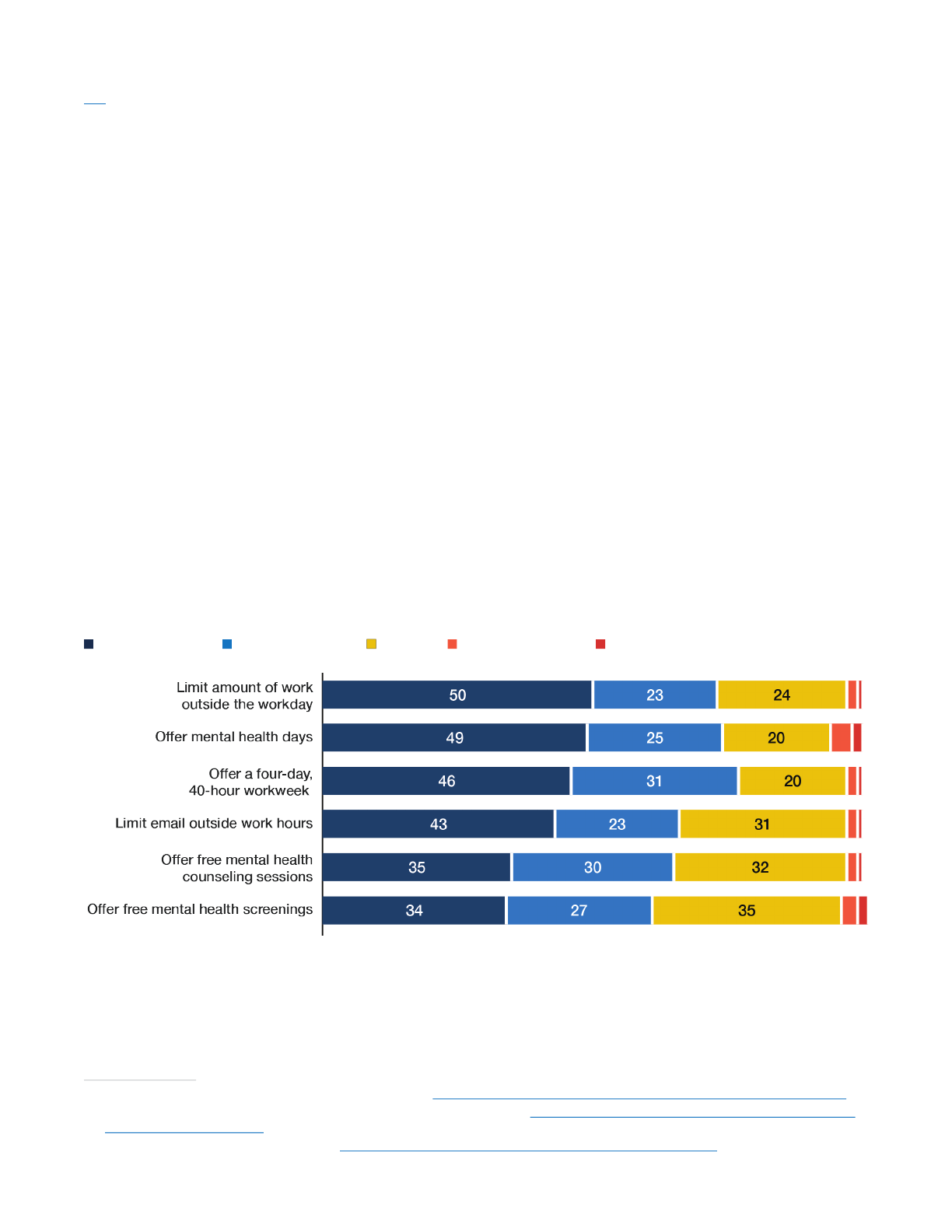
Bentley-Gallup
Business in Society Report

COPYRIGHT STANDARDS
This document contains proprietary research, copyrighted and trademarked materials
of Gallup, Inc. Accordingly, international and domestic laws and penalties guaranteeing
patent, copyright, trademark and trade secret protection safeguard the ideas, concepts and
recommendations related within this document.
The materials contained in this document and/or the document itself may be downloaded
and/or copied provided that all copies retain the copyright, trademark and any other
proprietary notices contained on the materials and/or document. No changes may be made
to this document without the express written permission of Gallup, Inc.
Any reference whatsoever to this document, in whole or in part, on any webpage must
provide a link back to the original document in its entirety. Except as expressly provided
herein, the transmission of this material shall not be construed to grant a license of any type
under any patents, copyright or trademarks owned or controlled by Gallup, Inc.
Gallup
®
is a trademark of Gallup, Inc. All rights reserved. All other trademarks and copyrights
are property of their respective owners.
Bentley-Gallup Business in Society Report
The 2023 Bentley-Gallup Business in Society study
is based on a Gallup Panel web survey completed
by 5,458 adults in the U.S., aged 18 and older,
conducted May 8-15, 2023. The Gallup Panel is a
probability-based longitudinal panel of U.S. adults
whom Gallup selects using random-digit-dial phone
interviews that cover landlines and cellphones. Gallup
also uses address-based sampling methods to
recruit Panel members. The Gallup Panel is not an
opt-in panel.
The sample for this study was weighted to be
demographically representative of the U.S. adult
population, using the most recent Current Population
Survey gures.
For results based on this sample, one can say that the
maximum margin of sampling error is ±1.8 percentage
points at the 95% condence level for response
percentages around 50% and ±1.1 percentage points
for response percentages around 10% or 90%,
design eect included. Margins of error are higher
for subsamples.
In addition to sampling error, question wording
and practical diculties in conducting surveys can
introduce error or bias into the ndings of public
opinion polls.
Copyright © 2023 Gallup, Inc. All rights reserved.
BentleyU_FrcGood_091823_hs
33

Bentley-Gallup Business in Society Report
Table of Contents
2
Foreword
4
Key Findings
8
Introduction
10
Detailed Findings
11
Americans believe businesses
have a positive impact on their
lives — but can do more.
18
Americans think businesses are
still falling short in important areas.
22
Americans are wary of articial
intelligence use in business.
27
Americans seek employers that
have a positive impact on their
workers — and the world.
32
Methodology
Copyright © 2023 Gallup, Inc. All rights reserved.
BentleyU_FrcGood_091823_hs
1

Bentley-Gallup Business in Society Report
Foreword
Copyright © 2023 Gallup, Inc. All rights reserved.
2

I’ll come right out and say it: there’s a fair amount to
be pessimistic about these days. Political acrimony,
persistent economic inequality, violence and injustice,
stubborn global ination, a growing international food
crisis. The list goes on.
Despite these headlines, I’m hopeful about where
our country is headed. My optimism is driven, in part
anyway, by my interactions with the young men and
women who are just beginning to realize the impact
they can have on the world. As the president of a
university, I am surrounded by these students every
day — the leaders of tomorrow who inspire me with
their talent, intelligence, compassion and desire to
make this world better than how they found it.
Here is something else that gives me hope: the power
and potential of business. At its best, business can
provide an enabling pathway for families, communities
and societies. In an era when incivility, anger and
tribalism have driven many to the extreme ends of
the political spectrum, businesses can provide an
important alternative, bringing us together in support of
the stores where we shop or the companies where we
work instead of pushing us apart.
I’m far from alone in this belief. This year, more
Americans — 63% — say businesses have a positive
impact on society. That number has risen signicantly,
even as Americans’ faith in other institutions has
fallen. I think the reason is clear. Positive margins
and protability necessitate community investment,
stakeholder engagement and commonality.
Successful businesses need to be responsive to
their customers and their communities. And they are
realizing it more and more. Without that engagement,
even the best idea will fail. A good business plan must
include generating positive value for society.
Business aects nearly every aspect of society.
That is why Bentley University has partnered with
Gallup to measure what Americans think about the
role of business in America. In this second annual
Bentley-Gallup Business in Society Report, we asked
5,458 U.S. adults about areas in which businesses
are having a positive impact — and where they are
falling short.
The survey explores topics, including articial
intelligence and exible work, that increasingly aect
our daily lives. In many areas, attitudes among
the 18- to 29-year-olds, who make up our future
consumers and workforce, dier radically from the
older executives who run many U.S. businesses.
These results should matter to every business leader
who cares about connecting with their customers
and recruiting and retaining talented workers. The
companies that learn about and respond to what
Americans expect and want will be the ones that
survive and have the most enduring impact in our
society. I’m hopeful about that, too.
E. LaBrent Chrite
President
Bentley University
Bentley-Gallup Business in Society Report
Copyright © 2023 Gallup, Inc. All rights reserved.
BentleyU_FrcGood_091823_hs
3

Bentley-Gallup Business in Society Report
Key Findings
Copyright © 2023 Gallup, Inc. All rights reserved.
4

Bentley-Gallup Business in Society Report
Americans believe businesses have a positive
impact on their lives — but can do more.
■ Sixty-three percent of Americans say businesses
have an extremely or somewhat positive impact
on people’s lives — an 8-percentage-point
increase from 2022.
■ While the majority (58%) of Americans think
businesses are extremely or somewhat eective
in positively impacting people’s lives, they see
room for businesses to do even more: 88% of
U.S. adults say businesses have a “great deal” or
“some” power to positively impact people’s lives.
■ Americans are more positive about small
businesses’ impact: Americans are twice as likely
to say small businesses have a positive eect
on people’s lives (85%), compared with large
businesses (42%).
■ Less than half (41%) of Americans say
businesses should take a public stance on
current events, a decline of 7 percentage points
from 2022. Americans are most supportive of
businesses speaking out on climate change
(55%) and mental health (52%), and least
supportive of businesses taking stances on
religion (15%), political candidates (19%) and
abortion (26%).
- Americans aged 18 to 29 are much more likely
to want businesses to take a public stance
on current events (53%) than those aged 45
and over (35%). This represents a signicant
tension between younger consumers
and the older executives who run many
U.S. businesses.
Americans think businesses are falling short in
important areas.
■ Fifty percent of Americans think businesses
negatively impact the environment.
■ Eighty-two percent of Americans believe avoiding
a major pay gap between the salaries of CEOs
and their average employees is somewhat
or extremely important, but only 13% say
businesses are doing an excellent or good job
at doing so.
■ Over 80% of Americans believe it is extremely
important that businesses make money in ethical
ways and compensate all workers fairly, but less
than one-third think businesses are eectively
doing both.
■ Americans want transparency from healthcare
companies: Ninety-ve percent of Americans say
healthcare companies should be required to tell
them how much a product or service will cost
before they receive it. However, only 17% say
they know how much their healthcare products
and services cost before they receive them.
Copyright © 2023 Gallup, Inc. All rights reserved.
BentleyU_FrcGood_091823_hs
5

Bentley-Gallup Business in Society Report
Americans are wary of articial intelligence use
in business.
■ Seventy-nine percent of Americans say they trust
businesses “not much” or “not at all” to use AI
responsibly, and 40% say AI does greater harm
than it does good.
■ Three-quarters of Americans believe AI will
reduce the number of jobs in the U.S. over the
next 10 years. Concern about the negative
eects of AI on the job market is especially high
among adults with less than a bachelor’s degree
and those aged 45 or older.
■ Americans believe AI is better than or as good
as humans at customizing the content users
see online (68%), recommending products or
services (65%), and assisting students with
their studies (60%). However, they think AI is
worse than humans at providing medical advice
(62%), driving cars (68%) and recommending the
employees a company should hire (69%).
- Americans aged 18 to 29 are much more likely
to trust AI to perform tasks better or as well as
humans, compared with older age groups.
Americans seek employers that have a positive
impact on their employees — and the world.
■ Fifty-ve percent of Americans say they would
move jobs to work at an organization that makes
a greater positive impact on society, and one
in four would do so even if it meant taking a
10% pay cut.
- Younger Americans feel even more strongly.
Seventy-one percent of workers aged 18
to 29 say they would leave their job to work
for an employer that has a greater positive
impact, and 29% say they would take a 10%
pay cut to do so.
■ More than 70% of Americans believe oering a
four-day, 40-hour workweek, limiting the amount
of work employees are expected to perform
outside the workday, and oering mental health
days, would increase employee wellbeing.
■ When considering taking a new job, 87% of
Americans say it is extremely or somewhat
important that a company oers exible work
arrangements, and 68% nd it important that
the company provides free mental health
support services.
Copyright © 2023 Gallup, Inc. All rights reserved.
BentleyU_FrcGood_091823_hs
6


Bentley-Gallup Business in Society Report
Introduction
Copyright © 2023 Gallup, Inc. All rights reserved.
8

Bentley-Gallup Business in Society Report
There is perhaps no institution more powerful in
America today than business. Whether a multinational
conglomerate or mom-and-pop shop, businesses
of all types form the bedrock of society by creating
jobs, generating wealth, and oering innovative
goods and services. They are engines of growth on
the global economic stage and are the heartbeat of
local communities.
While U.S. businesses have traditionally been rooted in
capitalistic ideals of generating shareholder value, there
is also growing interest in how these organizations
can increase value for society.
1
Notably, in 2019,
the CEOs of 181 leading multinational companies
released a joint statement redening the purpose of
their corporations — to promote prosperity, not only
for their shareholders, but also for their customers,
employees and the communities they serve.
2
1 Coen Gilbert, J., Houlahan, B., & Kassoy, A. (2015). What is the role of business in society? Aspen Institute. https://www.aspeninstitute.org/blog-posts/what-
role-business-society/
2 Business Roundtable. (2019, August 19). Business Roundtable redenes the purpose of a corporation to promote ‘An economy that serves all Americans’
[Press release]. https://www.businessroundtable.org/business-roundtable-redenes-the-purpose-of-a-corporation-to-promote-an-economy-that-serves-
all-americans
Although businesses may perceive themselves as
forces for good, do Americans view them in the same
light? In 2022, Bentley University and Gallup partnered
to quantify Americans’ attitudes toward businesses
and the impact they are making in their personal lives
and society more generally. The 2023 Bentley-Gallup
Business in Society Report builds upon insights
released in 2022, identifying changes in attitudes
toward businesses from 2022 to 2023, and addressing
new, important issues businesses are contending with,
including the use of articial intelligence. Results show
that while Americans believe businesses can make
a positive impact, they feel as if these businesses
are not realizing their full potential. The ndings from
web-based surveys with more than 5,000 Americans
reveal areas where businesses are excelling and
where they are falling short. In doing so, the research
oers insights for how businesses can positively
impact society.
Copyright © 2023 Gallup, Inc. All rights reserved.
BentleyU_FrcGood_091823_hs
9

Bentley-Gallup Business in Society Report
Detailed Findings
Copyright © 2023 Gallup, Inc. All rights reserved.
10

Bentley-Gallup Business in Society Report
Americans believe businesses have a positive impact on
their lives — but can do more.
3 For more information about the methodology of the 2022 Bentley University-Gallup Force for Good Study, see: bentley.edu/gallup/2022
Americans’ perception of the impact of
businesses is generally positive and has grown
since 2022.
In 2023, 63% of U.S. adults say businesses have an
extremely or somewhat positive impact on people’s
lives — an 8-percentage-point increase from 2022.
3
“
Is doing good, good for business? The
answer is a resounding ‘yes’! Businesses
benet when customers are thriving.
Businesses that nd concrete ways to
improve the wellbeing of customers through
their products, services and philanthropy will
earn trust and market share.”
— Vint Cerf, Chief Internet Evangelist
for Google and one of the “fathers of
the internet”
Americans’ views of businesses’ impact are consistent
across demographic groups, except for by age:
71% of adults aged 60 and older say businesses
have a positive impact on their lives, compared with
62% of adults aged 45 to 59 and 58% of adults
aged 18 to 44.
While Americans believe businesses have an overall
positive inuence on people, they worry about
businesses’ inuence on the environment.
One in two Americans believe
businesses are either extremely
or somewhat negatively
impacting the planet.
Views on environmental impact are sharply divided by
age and political aliation, with younger Americans
and Democrats much more likely than older adults and
Republicans to feel businesses have a negative impact
on the environment.
FIGURE 1
More Americans Today Think Businesses Have a Positive Impact on People’s Lives Than in 2022
In your opinion, which of the following best describes the impact businesses have on people’s lives?
2022 2023
Note: Due to rounding, percentages may not equal 100%.
Copyright © 2023 Gallup, Inc. All rights reserved.
BentleyU_FrcGood_091823_hs
11

Bentley-Gallup Business in Society Report
Americans are more positive about the impact
small businesses make, compared with
big businesses.
Twice as many Americans say small businesses have
a positive impact on people’s lives (85%) as say the
same of large businesses (42%). These ndings align
with prior Gallup research showing that small business
is the U.S. institution adults trust most (65%) and big
business one of the institutions they trust least (14%).
4
4 Saad, L. (2023, July 6). Historically low faith in U.S. institutions continues. Gallup. https://news.gallup.com/poll/508169/historically-low-faith-institutions-
continues.aspx
While roughly eight in 10 Americans of all genders,
races, ages and political parties believe small
businesses have a positive impact, some demographic
subgroups — including adults younger than 45, and
those who identify as LGBTQ+ — are far less likely
than their peers to believe large businesses have a
positive impact on people’s lives.
FIGURE 2
Americans Believe Small Businesses Have a More Positive Impact on People’s Lives Than
Big Businesses
In your opinion, which of the following best describes the impact [small/large] businesses have on
people’s lives?
% Extremely or somewhat positive
% Large business % Small business
Copyright © 2023 Gallup, Inc. All rights reserved.
BentleyU_FrcGood_091823_hs
12

Bentley-Gallup Business in Society Report
Americans believe businesses have the power
to enact change but are not realizing their
full potential.
Eighty-eight percent of Americans believe businesses
have a “great deal” or “some” power to positively
impact people’s lives; however, only 58% say
these organizations are very or somewhat eective
in doing so.
Although Americans see businesses as having less
power to impact people’s lives than federal, state
and local governments, they consider businesses
as marginally more eective than state and local
government entities, and notably more eective than
the federal government. Both the public and private
sectors, however, are far outpaced in perceived
eectiveness by charitable organizations, although
Americans believe these nonprot institutions wield
less power.
FIGURE 3
Americans Think Businesses Are Not Maximizing Their Power to Make a Positive Impact
How much power does each of the following groups have to make a positive impact on people’s lives?
How eective are the following groups at making a positive impact on people’s lives?
Note: Due to rounding, percentages may not equal 100%.
Copyright © 2023 Gallup, Inc. All rights reserved.
BentleyU_FrcGood_091823_hs
13

Bentley-Gallup Business in Society Report
Fewer Americans think businesses should
speak out on current events.
Less than half (41%) of Americans say businesses
should take a public stance on current events, a
decline of 7 percentage points from 2022.
Waning support among Democrats on this issue
is a main driver of the decrease — in 2022,
75% of Democrats said businesses should
adopt public stances, but that gure drops to
62% in 2023.
Few Americans are in favor of businesses taking
stances on major sociopolitical issues, such as
religion (15%), political candidates (19%) and
abortion (26%).
Of the 11 issues surveyed, climate change (55%)
and mental health (52%) are the only two that a
majority of Americans — albeit a slim majority —
favor corporations wading into publicly.
Copyright © 2023 Gallup, Inc. All rights reserved.
14

Bentley-Gallup Business in Society Report
These two topic areas — the
environment and mental health —
are also those that businesses’
behaviors and attitudes likely aect
the most; while the public might
perceive businesses as having to
comply with regulations related to
other policy areas (e.g., promoting
equitable hiring practices, providing
healthcare for employees), they are
less likely to feel businesses should
be inuencing those policies.
“
Corporate activism is an important part
of living into your purpose or living into
a purpose that your employees can
connect to. We have chosen to be
very focused on changing the course
of women’s health. We have chosen to
do that so our words around women’s
health and championing access to
healthcare for women are as authentic
and strong as they can be.”
— Lisa Hellmann, Senior Vice President
of Global Human Resources and
Corporate Communications at Hologic
FIGURE 4
A Slim Majority of Americans Say Companies Should Speak Out on Climate Change and
Mental Health
Do you think that business, in general, should take a public stance on subjects that have to do with
the following?
% Yes
Copyright © 2023 Gallup, Inc. All rights reserved.
15

Bentley-Gallup Business in Society Report
Overall, younger Americans are more supportive
of businesses speaking out: Whereas only 35% of
Americans aged 45 and over believe businesses
should speak out on current events, 47% of 30- to
44-year-olds think they should, and an even higher
percentage of 18- to 29-year-olds (53%) want
businesses to take a public stance.
This represents a large divide
between younger consumers
and the older executives who
run many U.S. businesses.
This division by age group persists when Americans
are asked about specic issues as well.
Younger Americans are much more likely than adults
over 60 to support businesses taking public stances
on LGBTQ+ issues, climate change, racial concerns
and abortion.
Besides younger Americans, Black Americans (61%),
Asian Americans (61%) and individuals identifying as
LGBTQ+ (57%) are particularly likely to say businesses
should comment on current events.
Of all observed demographic characteristics, political
party aliation has the strongest association with
support for businesses taking public stances on
current events. Democrats are more than three times
as likely as Republicans and nearly twice as likely as
independents to support businesses speaking out.
While this gap between Democrats and Republicans
is large, it has decreased 13 percentage points since
2022, largely due to a decline in Democrats’ support
for the practice.
FIGURE 5
Young, Black, Asian and LGBTQ+ Americans Are Most Likely to Say Businesses Should Take a
Public Stance
Do you think businesses, in general, should take a public stance on current events?
% Yes
Copyright © 2023 Gallup, Inc. All rights reserved.
BentleyU_FrcGood_091823_hs
16


Bentley-Gallup Business in Society Report
Americans think businesses are still falling short in
important areas.
While Americans generally think businesses are making a positive impact on people’s lives, they feel businesses are
not fully leveraging practices that promote environmental, social and corporate responsibility.
5 Alfonseca, K., & Zahn, M. (2023, July 7). How corporate America is slashing DEI workers amid backlash to diversity programs. ABC News. https://abcnews.
go.com/US/corporate-america-slashing-dei-workers-amid-backlash-diversity/story?id=100477952
Americans believe businesses should prioritize
fair compensation and ethical protmaking.
Americans prioritize business practices relating to
prot and compensation. Over 80% consider making
money in ethical ways and compensating all workers
fairly as extremely important. Americans believe it
is extremely important for businesses to prioritize
other practices, too, such as providing employees
high-quality healthcare benets (67%) and operating
in an environmentally sustainable way (59%),
though support in those areas is lower than for fair
compensation and ethical prots.
Notably, 74% of U.S. adults say promoting diversity,
equity and inclusion (DEI) is somewhat or extremely
important, a decrease of 4 percentage points
from 2022. This decrease may reect the recent
national backlash against DEI initiatives, especially in
the workforce.
5
Partisanship especially inuences how Americans
perceive the role of business implementing practices
that can make a positive impact. On every business
priority, Democrats assign the greatest level of
importance and Republicans the least. However,
there are areas of agreement, as Americans across
both parties are less divided over whether businesses
should make money ethically, oer fair wages and
improve the communities they serve.
Few Americans think businesses are excelling in
practices that can make an impact.
Most Americans say businesses are not excelling in
any of the 12 practice areas surveyed. More than
two in three Americans believe that businesses are
doing just a fair or poor job in oering fair wages to
all workers (70%) and making money in ethical ways
(68%) — the two practices that adults most want
businesses to prioritize.
Notably, Americans who identify a business practice as
“extremely important” are often signicantly less likely
to believe businesses are performing that practice well,
compared with their peers who state the practice is
less important. In other words, Americans who assign
the greatest responsibility to businesses to do good
are the least likely to believe they are doing so.
“
Creating an ‘ownership culture’ requires
much more than just sharing stock. For
example, employees need to be given
key information on business performance
and a voice in how the company operates
and invests. When done well, these
eorts create an environment where
employees feel included, respected
and trusted. This translates into lower
employee quit rates and higher levels of
engagement — and, consequently, stronger
corporate performance.”
— Pete Stavros, co-head of Global Private
Equity at KKR and founder of the nonprot
Ownership Works
Copyright © 2023 Gallup, Inc. All rights reserved.
BentleyU_FrcGood_091823_hs
18

Bentley-Gallup Business in Society Report
FIGURE 6
Percentage of Americans Saying Each Action Is Extremely Important for Businesses to Do,
Compared With the Percentage Who Believe Businesses Are Excellent or Good at It
In your opinion, how important is it that businesses, in general, do the following?
In your opinion, how do you think businesses, in general, are doing in the following areas?
% Excellent or good at it % Extremely important
Copyright © 2023 Gallup, Inc. All rights reserved.
BentleyU_FrcGood_091823_hs
19

Bentley-Gallup Business in Society Report
Americans think businesses can do more to lessen the pay gap between executives and employees.
One of the biggest gaps between how important Americans believe a business practice is and how they perceive the
ecacy of companies’ implementation of that practice relates to executive compensation.
6 Mishel, L., & Kandra, J. (2021). CEO pay has skyrocketed 1,322% since 1978. Economic Policy Institute. https://www.epi.org/publication/ceo-pay-in-2020/
Eighty-two percent of Americans
believe avoiding a major pay
gap between CEOs and average
employees is somewhat or extremely
important, but only 13% say
businesses are doing an excellent
or good job minimizing that gap.
This sentiment aligns with recent reports, which
estimate that CEO compensation grew 1,322%
between 1978 and 2020, compared with just 18%
wage growth for the typical worker; as a result, CEOs
of top rms earned 351 times more than their average
employee in 2020.
6
Large majorities of Americans
across age and demographic groups believe it is
important that companies reduce this growing gap
between CEO and worker salaries.
FIGURE 7
Majority of Americans Say It Is Important for Businesses to Reduce Pay Gap Between CEO
and Employees
How important is it that businesses avoid a major pay gap between CEOs and average employees?
% Extremely important % Somewhat important
Copyright © 2023 Gallup, Inc. All rights reserved.
BentleyU_FrcGood_091823_hs
20

Bentley-Gallup Business in Society Report
“
Companies can do more to educate people
on what goes into healthcare cost and
what they can expect in terms of quality.
So often, healthcare providers in particular
undercommunicate what a patient or person
should expect.”
— Lisa Hellmann, Senior Vice President of
Global Human Resources and Corporate
Communications at Hologic
Americans want healthcare companies to
be more transparent.
Another area where Americans say businesses
are falling short is transparency — particularly
among healthcare companies. When many
people see a doctor or visit the hospital,
they don’t know the cost of the care they
receive until much later. Ninety-ve percent
of Americans say healthcare organizations
should be required to tell them how much a
product or service will cost before they receive
it. However, only 17% say they know how
much their healthcare products and services
cost before they receive them.
Copyright © 2023 Gallup, Inc. All rights reserved.
21

Bentley-Gallup Business in Society Report
Americans are wary of articial intelligence use
in business.
Articial intelligence (AI) is revolutionizing the world of work, fundamentally transforming how companies do
business. Companies big and small are eagerly turning to AI to increase eciency and cut costs in the workplace,
7
but do Americans believe that embracing AI is at odds with businesses’ pursuit to be forces for good? The 2023
Bentley-Gallup Business in Society study nds evidence that businesses have work to do to arm their commitment
to using these tools to promote positive change in society.
7 Haan, K. (2023). How businesses are using articial intelligence in 2023. Forbes. https://www.forbes.com/advisor/business/software/ai-in-business/
Americans do not trust businesses to use
AI responsibly.
An overwhelming majority of Americans — 79% —
report trusting businesses “not much” or “not at all”
to adopt AI responsibly. Trust levels are consistently
low among all subgroups of the U.S. adult population,
including gender, race, age, education level and
political party aliation.
“
Responsible use of software, in general,
and AI/machine learning in particular, has a
lot to do with risk and who experiences it.
If the customers of products and services
experience risk in their use, the company
should bear some responsibility.”
— Vint Cerf, Chief Internet Evangelist
for Google and one of the “fathers of
the internet”
Copyright © 2023 Gallup, Inc. All rights reserved.
BentleyU_FrcGood_091823_hs
22

Bentley-Gallup Business in Society Report
FIGURE 8
Mistrust of Businesses’ Use of AI Is Widespread
In general, how much do you trust businesses to use articial intelligence responsibly ?
% Not at all % Not much % A lot/some
Copyright © 2023 Gallup, Inc. All rights reserved.
BentleyU_FrcGood_091823_hs
23

Bentley-Gallup Business in Society Report
Most Americans believe AI will eliminate jobs.
Lack of trust in businesses using AI responsibly may
be partly due to concerns about AI shrinking the size
of the workforce. Three in four Americans believe
articial intelligence will decrease the number of jobs
in the U.S. over the next 10 years. This concern is
especially high among those without a bachelor’s
degree and those aged 45 or older.
The future of the American workforce — 18- to
29-year-olds — is the least concerned about the
projected eects of AI on the job market. Sixty-six
percent of these young Americans believe AI will
decrease the number of jobs in the U.S., compared
with 72% of adults aged 30 to 44, 79% of adults aged
45 to 59, and 80% of adults 60 or older.
FIGURE 9
Most Americans Think AI Will Decrease Number of Jobs in the U.S.
In your opinion, what type of eect will articial intelligence have on the total number of jobs in the United
States over the next 10 years?
% Increase the number of jobs % No eect on the number of jobs % Decrease the number of jobs
Note: Due to rounding, percentages may not equal 100%.
Copyright © 2023 Gallup, Inc. All rights reserved.
BentleyU_FrcGood_091823_hs
24

Bentley-Gallup Business in Society Report
Americans are skeptical about AI’s benet
to society.
Just one in 10 Americans believe AI does more good
than harm. Fifty percent of U.S. adults believe AI does
equal amounts of harm and good and 40% say AI
does more harm than good. This wariness about the
eect of AI on society permeates all subgroups of the
adult U.S. population.
Interestingly, Black and Asian Americans have
a more positive view of AI’s benets to society:
Seventy percent of Asian and 67% of Black adults say
AI does more good than harm, or equal amounts of
harm and good, compared to 60% of Hispanic and
59% of white adults.
“
So, if we look at AI as a tool, it all depends
on how we use it. And what I’m spending
a lot of time analyzing is how can we use
it to make human beings better. I really
believe that human beings are meant to keep
evolving. We are all a work in progress.”
— Arianna Hungton, founder and
CEO of Thrive Global and founder of
The Hungton Post
Copyright © 2023 Gallup, Inc. All rights reserved.
BentleyU_FrcGood_091823_hs
25

Bentley-Gallup Business in Society Report
People think AI performs as well as or better than
humans at some tasks.
Although a minority of U.S. adults think AI does
more good than harm, Americans believe AI can
perform certain tasks as well as — or even better
than— humans, including: customizing the content
they see online (68%), recommending products or
services (65%), and assisting students with their
homework (60%).
But Americans are more skeptical of AI performing
other tasks. Sixty-two percent believe AI would do
worse than a person at recommending medical advice
(62%), driving cars (68%) and recommending the
employees a company should hire (69%).
In general, however, young Americans are more
optimistic about AI’s capabilities than older adults.
They think AI can especially enhance their online
experiences: For example, 82% of Americans aged
18 to 29 say AI is as good or better than people at
customizing the content they see online, the highest
of any age group.
FIGURE 10
Americans Think AI Performs Better or as Well as People at Select Tasks
In your opinion, how well does articial intelligence do the following compared with a person?
% Performs better than a human % Performs the same as a human % Performs worse than a human
Note: Due to rounding, percentages may not equal 100%.
*Asked of respondents with social media
Copyright © 2023 Gallup, Inc. All rights reserved.
BentleyU_FrcGood_091823_hs
26

Bentley-Gallup Business in Society Report
Americans seek employers that have a positive impact on
their workers — and the world.
8 Iacurci, G. (2023, February 1). 2022 was the ‘real year of the Great Resignation’ says economist. CNBC. https://www.cnbc.com/2023/02/01/why-2022-was-the-
real-year-of-the-great-resignation.html
9 Harter, J. (2023). Is quiet quitting real? Gallup. https://www.gallup.com/workplace/398306/quiet-quitting-real.aspx
In 2023, an unprecedented 50.5 million adults quit
their jobs, surpassing the previous year’s record
of 47.8 million.
8
Gallup research indicates that at
least 50% of U.S. workers are also “quietly quitting”
— becoming increasingly disengaged, minimally
productive and psychologically disconnected from their
work.
9
This challenging landscape is leading employers
to re-examine their business practices to retain current
employees and recruit new employees. The 2023
Bentley-Gallup Business in Society study specically
asked Americans to rate business practices that would
be most important to them when deciding whether to
take a new job.
Fair wages for workers and high-quality healthcare
are the top priorities of Americans when searching
for a new job. But, Americans also place high
importance on whether a potential employer promotes
their individual wellbeing. Eighty-seven percent
of Americans say exible work arrangements are
extremely or somewhat important when considering
where to work and 68% say the same about free
mental health support services oered by an employer.
Overall, Americans place less focus on societal
benets like promoting DEI, operating sustainably and
making the world a better place.
“
One of the things I tried to do as a U.S.
Ambassador and career diplomat was
to think in terms of individualism — be
that for a person or respect for the
uniqueness of a culture or nation. Linking
this to business, what I hear the most from
millennials, Gen Zers and the ‘Born Globals’
is one of these things: people do not always
see me, hear me or address issues important
to me (e.g., quality of life, sustainability,
community, wage fairness). This data
underscores what is top-of-mind to today’s
workforce. To which, business leaders
need to reply, ‘I see you, I hear you and I
am responding.’”
— Ambassador Dr. Robin Sanders, former
U.S. Ambassador to Nigeria, Republic of the
Congo, entrepreneur, scholar and author
Copyright © 2023 Gallup, Inc. All rights reserved.
BentleyU_FrcGood_091823_hs
27

Bentley-Gallup Business in Society Report
FIGURE 11
Fair Wages and High-Quality Healthcare Are Top Priorities for Potential Job Seekers
Hypothetically, when searching for a new job, how important would each of the following factors be when
deciding which company or workplace to apply for?
% Extremely important % Somewhat important % Not very important % Not important at all
Note: Due to rounding, percentages may not equal 100%; numerals shown when ≥5%.
Copyright © 2023 Gallup, Inc. All rights reserved.
BentleyU_FrcGood_091823_hs
28

Bentley-Gallup Business in Society Report
Americans want to work for employers that
change the world.
Americans say they would leave their current job for
one that has a more positive impact on the world —
even if it aects their paycheck.
Most employed Americans (55%)
say they would move jobs to make a
greater positive impact. One in four
Americans would leave their job even
if it meant taking a 10% pay cut.
Young Americans are more willing than those in any
other age group to take a lower paying job to achieve
greater impact. Seventy-one percent of workers under
30 would move jobs to make a greater positive impact
on the world, and 29% of such workers would take a
10% pay cut to do so. By contrast, 29% of workers
60 and older would leave their current job to work at a
company that has a greater impact on the world, and
15% of that group of older Americans would still leave
if switching jobs required a 10% pay cut.
FIGURE 12
Young Adults, Democrats and Those Identifying as LGBTQ+ Are Most Likely to Switch Jobs to
Achieve Greater Impact
Would you be willing to leave your current job to work at an organization that has a greater positive impact
on the world?
Among employed Americans
% Yes % Yes, with 10% pay cut
Copyright © 2023 Gallup, Inc. All rights reserved.
BentleyU_FrcGood_091823_hs
29

Bentley-Gallup Business in Society Report
Americans say workplace changes would improve
their wellbeing.
Just 52% of Americans believe businesses make an
overall positive impact on people’s wellbeing — which
encompasses career, nancial, social, physical and
community wellbeing.
10
And many Americans feel
their employers are not promoting the wellbeing of
their employees.
11
Indeed, Gallup research nds that
50% of U.S. employees today are looking to leave
their current organization — and that dissatisfaction
with their wellbeing and work-life balance is one of
the main reasons for departing.
12
Embracing practices
that improve wellbeing is thus a potential avenue
businesses can explore to improve their overall impact
on society, as well as increase employee retention.
10 Gallup. (2023). What is employee wellbeing? And why does it matter? https://www.gallup.com/workplace/404105/importance-of-employee-wellbeing.aspx.
11 Harter, J. (2023). Percent who feel employer cares about their wellbeing plummets. Gallup. https://www.gallup.com/workplace/390776/percent-feel-employer-
cares-wellbeing-plummets.aspx
12 Gallup. (2023). Employee retention and attraction. https://www.gallup.com/467702/indicator-employee-retention-attraction.aspx
When asked to rate actions that employers could
take to increase employees’ wellbeing, 77% of
Americans say oering a four-day, 40-hour workweek
for employees who typically work ve-day, 40-hour
workweeks would improve their wellbeing. The
perceived positive impact of a condensed workweek
is greater among younger workers, with 82% of 18- to
29-year-olds saying it would positively aect their
wellbeing — the highest of any age group. Similarly,
66% of Americans say limiting the amount of time
they are expected to spend on work emails outside
of the workday would improve their wellbeing. A large
majority (74%) also say oering paid “mental health
days” to employees, like paid sick days or vacation
days that many employers already oer, would
have an extremely or somewhat positive impact on
their wellbeing.
FIGURE 13
Americans Are Optimistic About the Impact of Employer Wellbeing Initiatives
If your employer did the following, what type of eect would it have on your wellbeing?
% Extremely positive % Somewhat positive % Neutral % Somewhat negative % Extremely negative
Note: Due to rounding, percentages may not equal 100%; numerals shown when ≥5%.
Copyright © 2023 Gallup, Inc. All rights reserved.
BentleyU_FrcGood_091823_hs
30

Bentley-Gallup Business in Society Report Bentley-Gallup Business in Society Report
“
The ‘War for Talent’ continues to intensify as
employees have (and exercise) much more
control over their mental, physical, nancial
and spiritual wellbeing and place new
requirements on employers to deliver a much
more employee-centric value proposition.”
— Reggie Van Lee, Partner and Chief
Transformation Ocer at Carlyle
Copyright © 2023 Gallup, Inc. All rights reserved.
31

Bentley-Gallup Business in Society Report
Method ology
Copyright © 2023 Gallup, Inc. All rights reserved.
32

COPYRIGHT STANDARDS
This document contains proprietary research, copyrighted and trademarked materials
of Gallup, Inc. Accordingly, international and domestic laws and penalties guaranteeing
patent, copyright, trademark and trade secret protection safeguard the ideas, concepts and
recommendations related within this document.
The materials contained in this document and/or the document itself may be downloaded
and/or copied provided that all copies retain the copyright, trademark and any other
proprietary notices contained on the materials and/or document. No changes may be made
to this document without the express written permission of Gallup, Inc.
Any reference whatsoever to this document, in whole or in part, on any webpage must
provide a link back to the original document in its entirety. Except as expressly provided
herein, the transmission of this material shall not be construed to grant a license of any type
under any patents, copyright or trademarks owned or controlled by Gallup, Inc.
Gallup
®
is a trademark of Gallup, Inc. All rights reserved. All other trademarks and copyrights
are property of their respective owners.
Bentley-Gallup Business in Society Report
The 2023 Bentley-Gallup Business in Society study
is based on a Gallup Panel web survey completed
by 5,458 adults in the U.S., aged 18 and older,
conducted May 8-15, 2023. The Gallup Panel is a
probability-based longitudinal panel of U.S. adults
whom Gallup selects using random-digit-dial phone
interviews that cover landlines and cellphones. Gallup
also uses address-based sampling methods to
recruit Panel members. The Gallup Panel is not an
opt-in panel.
The sample for this study was weighted to be
demographically representative of the U.S. adult
population, using the most recent Current Population
Survey gures.
For results based on this sample, one can say that the
maximum margin of sampling error is ±1.8 percentage
points at the 95% condence level for response
percentages around 50% and ±1.1 percentage points
for response percentages around 10% or 90%,
design eect included. Margins of error are higher
for subsamples.
In addition to sampling error, question wording
and practical diculties in conducting surveys can
introduce error or bias into the ndings of public
opinion polls.
Copyright © 2023 Gallup, Inc. All rights reserved.
BentleyU_FrcGood_091823_hs
33

Bentley-Gallup
Business in Society Report
